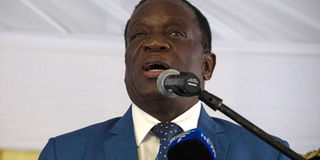Declaring oneself president is a road paved with good intentions

Zimbabwean President Emmerson Mnangagwa delivers a speech during a rally with Zimbabwean businessmen and foreign investors at the Zimbabwean embassy in Pretoria, South Africa. PHOTO | STRINGER | AFP
What you need to know:
Mr Odinga has hinted at borrowing a leaf from Emerson Mnangagwa, who was recently sworn in as President of Zimbabwe, and promptly appointed the army boss as his vice president.
Despite its pretensions to democracy, the promulgation of an ambitious Constitution and a loud and boisterous population, Nigeria is a military country.
Yellow fever — that is the certificate you need to enter Nigeria. Without it, your passport together with the visa and assurances of your president, together with the bonus of marrying a Kenyan for free citizenship will likely not count for much.
Unaccustomed to the comforts of first class travel, said yellow fever certificate lost itself between the business lounge in Kigali and Lagos, where a port health official demanded to make visual acquaintance with it. Nigeria holds the gold medal for corruption, but on this occasion the official uses his discretion to believe that the yellow fever certificate is indeed lost. The pregnant moment of waiting for a demand for kola only yields: “Welcome to Nigeria.”
Nearly 20 years ago when then Kenyan President Daniel arap Moi landed in Lagos for a continent-wide malaria conference, a groundsman who drove the ladder to the jet reportedly demanded his $100 up front or, as he put it: “You can tell your president to go jump.”
FREE POLLS
Only five years earlier, Chief Moshood Abiola had died in jail in unexplained circumstances on the day he was due for release — and a day before military ruler Sani Abacha expired in the throes of pleasure.
Chief Abiola had been elected president of Nigeria in what is considered the freest election in 1993. But the then military strongman Ibrahim Babangida annulled that election, and was in turn deposed by General Abacha.
Chief Abiola had travelled on worldwide tours telling anyone who cared to listen that he had been robbed of the presidency after winning 58.4 per cent of the vote, with a majority in 20 of the 30 states.
When he returned home at Epetedo in Lagos, a full year since his election to declare himself president, Gen Abacha ordered his arrest on treason charges.
Back in Kenya, National Super Alliance leader Raila Odinga, who successfully petitioned for the annulment of the August 8 presidential election result, has postponed taking the oath of office as the ‘People’s President’, and already there is talk of treason in the air.
MILITARY
Mr Odinga has hinted at borrowing a leaf from Emerson Mnangagwa, who was recently sworn in as President of Zimbabwe, and promptly appointed the army boss as his vice president.
Despite its pretensions to democracy, the promulgation of an ambitious Constitution and a loud and boisterous population, Nigeria is a military country. It is the army that wears the pants. Every 100 kilometres or so, there is a permanent roadblock with sandbags piled chest high and manned by youth in uniform.
Invariably, the firearm of at least one of the armed sentries has a red ribbon on the muzzle, and it is not a sign of compassion for those affected by HIV/Aids: It is a licence to shoot to kill, no questions asked.
Nigeria has just over 180,000 troops straddling over 923,768 square kilometres of territory, about twice Kenya’s size, but it also carries great voice in the Economic Commission of West African States.
STRUGGLING
It is, after all, an oil-producing State. At Christmas, the exodus to the villages scattered over the nearly one-million square kilometres of territory in 36 states begins, and it is not unlike the great annual migration to ancestry witnessed in Kenya at the same time. The price of petrol in this oil producing nation could yoyo from the regular 145 Naira (Sh42) to 400 Naira (Sh116), with the petroleum authority suspending trading until after the festive season.
It is a country struggling to rediscover its innocence. However, when Kenya grows up, it wants to be Nigeria.
The writer is a Programme Advisor, Journalists for Justice. The views expressed here are his own and do not reflect those of JFJ. [email protected]





